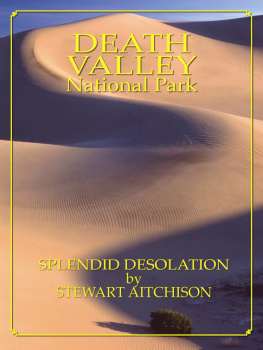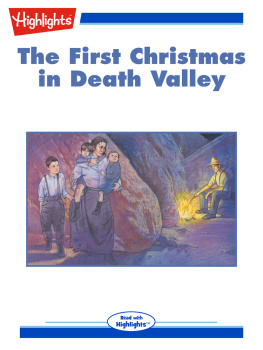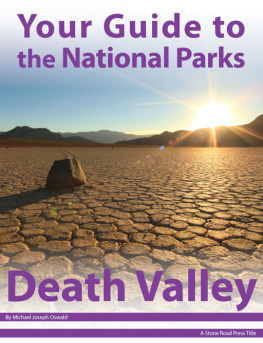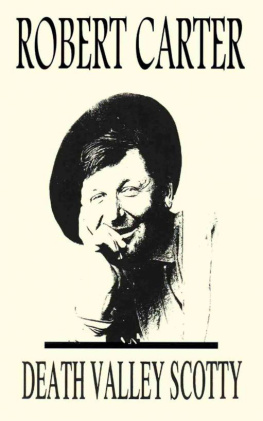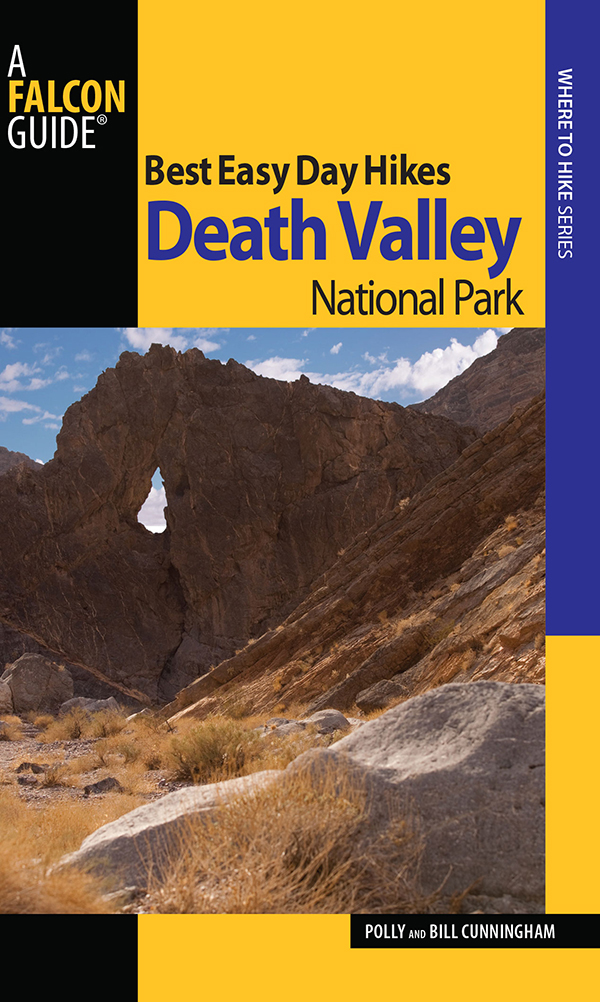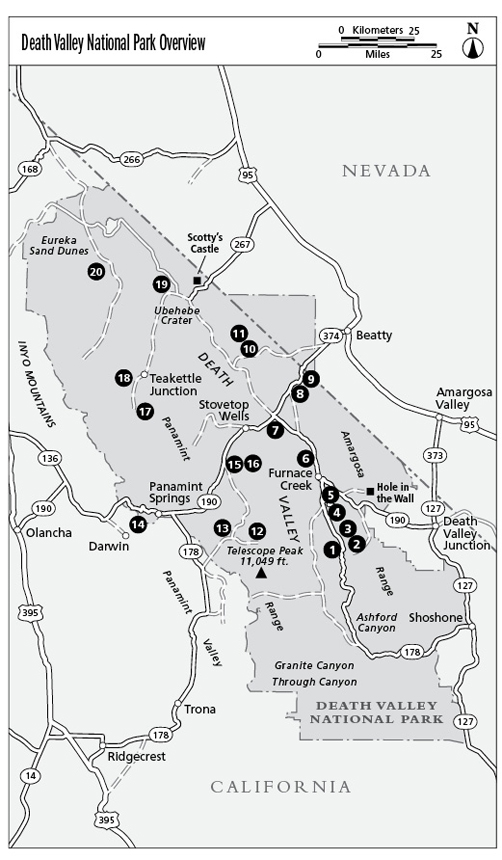Best Easy Day Hikes Series
Best Easy Day Hikes Death Valley National Park
Second Edition
Polly and Bill Cunningham
Copyright 2000, 2011 by Morris Book Publishing, LLC
ALL RIGHTS RESERVED. No part of this book may be reproduced or transmitted in any form by any means, electronic or mechanical, including photocopying and recording, or by any information storage and retrieval system, except as may be expressly permitted in writing from the publisher. Requests for permission should be addressed to Globe Pequot Press, Attn: Rights and Permissions Department, P.O. Box 480, Guilford, CT 06437.
FalconGuides is an imprint of Globe Pequot Press.
Falcon, FalconGuides, and Outfit Your Mind are registered trademarks of Morris Book Publishing, LLC.
Project editor: Gregory Hyman
Layout: Kevin Mak
Maps: Trailhead Graphics Inc. Morris Book Publishing, LLC
TOPO! Explorer software and SuperQuad source maps courtesy of National Geographic Maps. For information about TOPO! Explorer, TOPO!, and Nat Geo Maps products, go to www.topo.com or www.natgeomaps.com.
Library of Congress Cataloging-in-Publication Data is available on file.
ISBN 978-1-4930-0502-4
The authors and Globe Pequot Press assume no liability for accidents happening to, or injuries sustained by, readers who engage in the activities described in this book.
To the thousands of citizens of California and elsewhere, past and present, who laid the groundwork for protection of much of the California desert, to those who helped secure passage of the landmark California Desert Protection Act, and to the dedicated park rangers and naturalists charged with stewardship of the national treasure that is Death Valley National Park.
Contents
The Hikes
Introduction
Death Valley National Park contains some of the planets most imposing and contrasting landscapesfrom North Americas hottest, driest, and lowest desert to soaring snowcapped peaks. With such extremes, Death Valley commands respect and entices discovery.
The California Desert Protection Act of 1994 upgraded and expanded the two-million-acre Death Valley National Monument into todays 3.4-million-acre national park, 91 percent of which is designated and managed as wilderness under the landmark 1964 Wilderness Act.
Despite its ominous name, Death Valley hosts more than 400 year-round and seasonal wildlife species. More than 300 of these species are birds, the great majority of which are seasonal migrants. Most wildlife is nocturnal and usually unseen by the human eye. Your day hikes in the park will reveal spectacular desert scenery, complex geology, primeval wilderness, historical and cultural sites, and perhaps even a fleeting glimpse of rare wildlife.
Best Easy Day Hikes Death Valley is a shortened and updated version of the Death Valley National Park section of Hiking Californias Desert Parks, Second Edition. This compact guidebook features easily accessible hikes that appeal to the full spectrum of visitorsfrom kids to grandparents. These twenty hikes sample the best that Death Valley has to offer, for the casual hiker and also for those in search of a mellow start to a longer, more difficult hike.
Most of the hikes in Best Easy Day Hikes Death Valley are shortless than 4 miles round-trip and with less than 600 feet of elevation change. More than half the hikes are ideal for families with small children. All of the trailheads can be reached with a passenger car, and about one-third are accessed by a paved road. The best easy day hikes are well distributed throughout the more accessible central portion of the sprawling park, which is served by paved highways going north-to-south and east-to-west.
For the most part, options listed at the end of each hike description are extensions or longer variations of the hike. Consider these if you find yourself with that wonderful combination of additional time, energy, and determination.
Please keep in mind the park has very few developed trails. Wildrose Peak and Telescope Peak are the only backcountry trails maintained by the park. Most hiking is up canyons, across salt flats and alluvial fans, or over dunes where any trail would soon be erased by ever-shifting sands. Fortunately, hiking on these natural trails is often easier than on constructed paths.
There is a park entrance fee per vehicle valid for seven days. The interagency America the Beautiful and Golden Access passes are honored as well.
For current information on park regulations, weather, campgrounds, park resources, hiking trails, and road conditions, contact Death Valley National Park at (760) 786-3200 or visit the park Web site. The Web site for the park is www.nps.gov/deva/. You can check the official park Web site for weekly ranger programs, including ranger-guided walks offered during the peak season of November through April. You can also use the Web site to request a park map and brochure by sending an e-mail to the National Park Service Office of Public Affairs.
The Furnace Creek Visitor Center is open daily from 8 a.m. to 5 p.m. Ranger-guided hikes are offered during the peak season of November through April. Before you begin hiking, be sure to stop at the visitor center or a ranger station to get updated regulations and other information that will make your trip more enjoyable.
Death Valley is busiest from February through mid-April, and in November. Surprisingly, the lowest visitation occurs during December and January, not during the hot summer months as you might expect.
Wildflowers
Rain throughout winter and spring, along with warm, sunny days and lack of drying winds, produces good wildflower years.
The park hosts more than 1,000 plant species, including twenty-three species endemic to the region as well as thirteen species of cactus. Desert annuals, like poppies and primroses, are the showiest.
Typical peak blooming periods are:
- Mid-February to mid-April at lower elevations (the valley floor and alluvial fans).
- Early April to early May for elevations between 3,000 feet and 5,000 feet (upper desert slopes, canyons, and higher valleys).
- Early May to mid-July for elevations above 5,000 feet (mountain slopes, pinyon pine/juniper woodlands).
Photography
The land of extremes that is Death Valley is best dramatized for the photographer when 11,049-foot Telescope Peak casts its afternoon shadow across the 282-feet-below-sea-level Badwater Basin. Combine this astounding vertical relief with recent volcanic craters, towering sand dunes, and flood-scoured canyons, and youll see why knowledgeable photographers bring extra storage cards and batteries. These geologic wonders are most spectacular during the low-angle-light hours of morning and evening. Sunrises and sunsets are awe-inspiring.
Play It Safe
Wandering in the desert has a reputation of being a dangerous activity, thanks to both the Bible and Hollywood. Usually depicted as a wasteland, the desert evokes fear. With proper planning, however, desert hiking can be fun, exciting, and quite safe.
An enjoyable desert outing requires preparation. Beginning with this book, you need to be equipped with adequate knowledge about your hiking area. The potential hazards of desert hiking can be mitigated if you are prepared.


